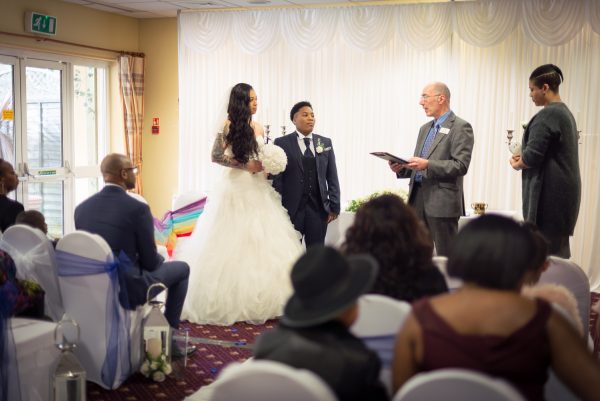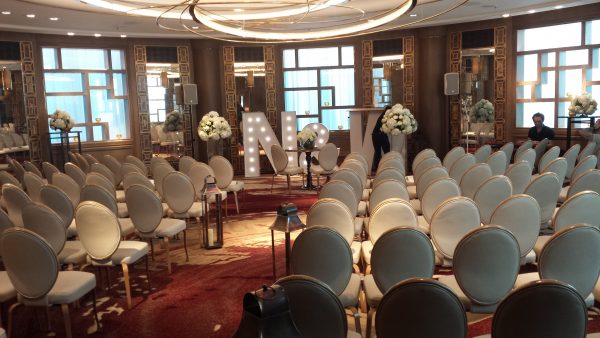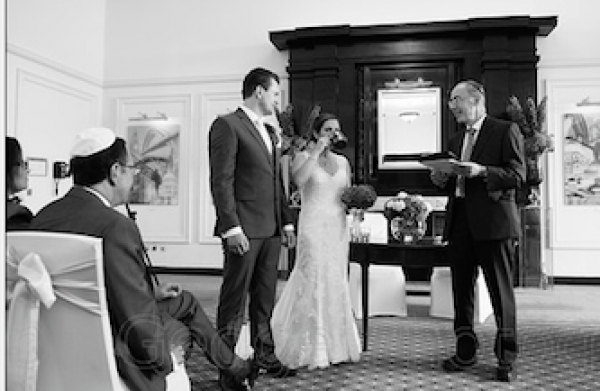
by Michael | Aug 2, 2018 | Blog
With same-sex weddings legal in England & Wales for some time now, they are becoming increasingly popular. But not with everybody. Indeed, same-sex ceremonies is an area which may provoke major opposition from the family. Let’s therefore take a serious look at this issue.
The guest list
All weddings face the inevitable question: whom do you invite? Selecting your guests is a tough one to answer at the best of times. You will probably start with close family and friends, but what if your closest relatives oppose your union?
Rejecting the rejectors
If it looks like relatives will boycott your ceremony, do you go with the flow and simply not invite them? Isn’t it better all round to opt for your friends and (supportive) relations? After all, you’re likely to be spending a huge amount of money on the reception. Why should you have to accommodate people who won’t accept what you’re doing and, at worst, might even turn out to be trouble-makers?
No one would blame you for thinking twice before inviting people openly hostile to your union. On the bright side, they might decline and at least you’ll have gained kudos by having extended the olive branch!
An unexpected “win”
Another advantage from inviting disapproving relatives is that they might, albeit grudgingly, attend and – who knows? – even enjoy a tasteful and personalised ceremony. Wouldn’t that be something if you were able to ‘convert’ them and retain – even develop – a warm relationship with them?!
For many of us, there is the bond of love that unites us with our families. We may not always like our relations, but to upset and potentially do without them for the rest of our lives is something we would do only when all else has failed. Giving them a chance to stay connected with you (even loosely) is surely worth the effort.
If the worst comes to the worst, at least you’ll know you tried. And you stand to gain such a lot, if you can bring those relatives together with you.
Come what may, your ceremony will be a commemoration of love, with promises for the future. It’s not the day to heal rifts, but it may be the pathway to do so, and that is something which should be embraced.
A few thoughts
Why should a gay wedding be drastically different to a traditional, heterosexual one? There’s no reason why women should not be in white, and carrying bouquets of lilies. Men can certainly be in suits. The wedding day is the most important day of their lives, and they are entitled to choose to mark it by looking their very best. The affair can be elegant and tasteful – and, in my view, should be.
Gay marriage is legal in most States of the US and is becoming commonplace in the UK too, so let’s become more comfortable with the concept.
In a ‘traditional’ gay wedding, there are some questions to consider: should there be “bridesmaids” – or even whatever the masculine equivalent is? Or a combination of them? And what about surnames? Should either of the pair change their name after marriage? If so, which one? Presumably, that will be down to choice.
There may be some decisions for the officiant: instead of “you may kiss the bride”, the easiest thing would simply be “you may kiss”.
Of course, at present, there’s not really much of a precedent for gay marriages, so the traditions are up for grabs. But do we need to invent any, actually?
To find a civil celebrant for your personalised wedding, look no further than https://vowsthatwow.co.uk/civil-weddings/

by Michael | Jul 9, 2018 | Blog
Weddings and public speaking go together. And stage-fright is often an (unwelcome) part of the process.
In fact, according to statistics, many people fear delivering a speech more than they fear death!
The likelihood is that you will be called upon to write and deliver a speech at least some time in your life. It may be for a business presentation or else for a family event. It could be in front of a handful of people or before a whole crowd. However, it is a skill that is well worth mastering.
My story
Only a few years ago, I needed persuasion before I would even enter a room to network. After a while, I became more comfortable. Then I was persuaded to give a 10-15 minute presentation about my business in front of 18 people. That was a step too far! I was so nervous that I gestured wildly and shattered a glass of water. I became memorable, but not at all for the right reasons!
Now, I willingly and confidently address small crowds (I haven’t got to the 1000s stage, but I hope that may happen). Recently, I was put in front of 200 guests at the Savoy, and it wasn’t an issue. Indeed, as a civil celebrant, my success depends, at least in part, on my presentation skills.
I’d therefore like to pass on knowledge and tips that I have acquired, so that the potential ordeal of public speaking can become much more palatable.
Focus
I am going to concentrate here on celebratory-type ceremonies. Essentially, we will need to focus on content and delivery. Here are some thoughts as a starting-point.
Tips
- It is better to be brief than over-long – your audience may be hot, tired, hungry
- If you can deliver humour successfully, do so; if not, keep those jokes to a minimum!
- Avoid too many “in-references” – at a wedding half the guests may not know anything about one of the newly-weds, so in-jokes can fall very flat and exclude whole groups
- Use a script or, better still, numbered 3 x 5″ cards. (Only very accomplished, experienced speakers can deliver off the cuff). Rehearse so that you can deliver your speech with only occasional reference to your notes. Eye contact with your audience is very important, if you are to engage with them
- There may be a good sound system, but ensure you can be heard loudly and clearly – you can help that by not burying your head in your notes and by speaking s-l-o-w-l-y ( a lot slower than you may expect!)
- Avoid saying anything controversial, whether about personalities in the room or about politics – the idea of the proceedings is to create a wonderful atmosphere, not to score points!
- Use anecdotes, but ones that fit in and are relevant. Avoid meandering ‘shaggy dog’ stories that may lose your audience. If you are not good at crafting a good story, maybe you can get someone to help you
- Delivery should be slower, rather than faster, and do not be afraid of a silence, if appropriate. Try not to address one area of the room only, but make everyone feel included
If you need any more advice, then there are professional presenters out there who can help. And I would be happy to help too.
Remember that it is a privilege to be asked to give a speech, so be grateful. Remember your audience at all times. Oh, and, however nervous you may be, save the alcohol for afterwards!
Enjoy the occasion.

by Michael | Jun 5, 2018 | Blog
You probably wouldn’t expect last-minute situations at weddings and the like, would you?
After all, surely such ceremonies are arranged well in advance, so everybody knows what they are supposed to be doing. Don’t they?
Well, my civil celebrant experience has taught me that long-term planning and weddings don’t always go together.
Cutting it fine
I was recently asked to write and conduct a wedding at the Savoy (no less!) with only eleven days notice. I don’t know what had happened. I suspect the family had made too many demands on the assigned celebrant. Anyway, I was happy to do it. (I was less happy when they changed the ring-bearer without telling me. That meant that I called up a non-existent person during the ceremony!)
But, believe me, eleven days is not a generous time-span.
None so queer as folk!
Last April I was contacted to do a wedding in a month’s time. Short notice too, but I am known for working efficiently and fast. So, no problem, think I.
It was just going to be the three of us – no guests. Unusual, but the clients are entitled to their choice.
Then it emerged that they weren’t going to get married (legally) at all. This meant that, with or without guests, I wouldn’t be able to pronounce the couple “man and wife”. I explained this and suggested a Commitment Ceremony, instead.
They were happy with that and said they’d book me. They then asked if I could recommend any photographers, which I did.
The next thing was … total radio silence.
Finally, a week before the day, they e-mailed me a completed “Request to Start Work” form (without even a covering e-mail). However, no payment was ever sent.
I tried to follow up, but always radio silence, so I gave up.
Had they ever really been trying to arrange some sort of ceremony? Had they found someone else? Were they simply wasting my time?
People can be very strange.
Another last-minute job
My record for last-minute ceremonies took place a couple of years ago.
One August day, my family was all ready to go off for a week’s holiday. It was a Friday morning. The suitcases were literally on the doorstep and we were making our way out when the phone rang. I wanted to ignore it, but my wife insisted on answering.
Would I be available to lead a ring blessing on Saturday evening (in 8 days)?
I explained my circumstances – I was sorry, but I wouldn’t be in a position to compile something suitable from abroad. (I always e-mail out drafts for clients’ approval before the ceremony, and I am passionate about delivering a professional service. I could make no guarantees in this case.)
I therefore gave them contact details of another civil celebrant who might be free. I told them that I’d try and access my e-mails on holiday, just in case. If they were still desperate, they could e-mail me and I’d see what I could do on the day itself.
Off we went, and I was able to see my e-mails. Nothing of note arrived. We got back on Friday evening and I immediately checked e-mails again. Not a word. So I knew was clear.
The following morning I was free to go out. Returning at lunchtime, there was a message for me. Could I please call them – after 2 p.m.?
It turned out that they did still want my services – with the ceremony due to start in the small matter of five hours!
I guess I wouldn’t be writing this, if there hadn’t been a happy ending!
Suffice it to say that that short phone call gave me an idea of what was required. I couldn’t send the draft for approval (as it was to be a surprise for the wife, and their e-mail address was shared), and had to take pot luck and write what I judged would be suitable. Fortunately, she burst into tears (of joy!), they loved it and all was well!
The moral
You might be able to get away with it. But you might not. So it’s much better that you plan your ceremony well in advance rather than relying on goodwill or chance! There is never a guarantee of a happy ending.
Whether or not you are in a rush, feel free to contact Michael for help and guidance!

by Michael | May 22, 2018 | Blog
Is there much interest in mixed-faith ceremonies? Surely they make up only a minute proportion of marriages?
Much of my work as a civil celebrant involves mixed-faith ceremonies. And I notice that such ceremonies are now becoming mainstream.
Not long ago I read that 45% of Americans are intermarried. That includes 46% of mainline Protestants, 32% of Evangelical Protestants, 22% of Catholics and 44% of Jews. I don’t have the UK statistics, but it wouldn’t surprise me if the trend were not similar.
In any case, that means a lot of people are intermarrying.
So what do you have to think about if you are planning a mixed-faith wedding?
Disadvantages
One obvious problem can be the family (indeed, in my experience, this area can sometimes be very fraught!) .
Whether or not the family is bankrolling the wedding, and therefore ‘pulling the strings’, religion is a potential minefield. Even though the parents may not actually be all that committed service-attenders, they often have an absolute expectation of a traditional ceremony. So there’s immediate conflict and pressure on the couple.
In such cases, the couple need to acknowledge and understand the disappointment that intermarriage might cause. But compromise is possible. An example might be that the father can still walk the bride down the ‘aisle’, (even if the aisle isn’t actually in a religious building).
However, the couple must not be bullied into doing what they do not want or believe.
Another thing the pair need to consider is eventual children, and the question of how (religiously) to bring them up. I don’t think there is any categorical guidance one can really give – it’s a decision for the couple alone, but they do have to be prepared to confront it.
Advantages
Being ‘put on the spot’ by marrying means that both partners will need to sort out their religious stance. They can learn about their partner’s customs, and this will help them create a meaningful wedding ceremony – and guide them in their future spiritual life together.
They will be able to work with their celebrant to agree on a service that is in accordance with their beliefs and desires. They can then include customs and traditional rituals from either religion as they choose – a kind of “edited highlights”, perhaps?
I am currently booked to perform a Jewish wedding (under the marriage canopy) for a Jewess and Christian. We’re having a New Testament reading and a hymn, but most of the rest will be traditional Jewish (with a couple of ‘extras’ thrown in).
The couple are also selecting readings relevant to them and which underline their mutual love and willingness to make a commitment to each other. These personalised readings can lift the occasion far above the mundane.
Compromise
Parents can be reassured that any grandchildren will be taught about their religious background (even if they may not actively practise it), that they will visit for certain religious holidays, and that parents will be able – and welcome – to play a part in their grandchildren’s lives.
It may take time, but a beautiful interfaith wedding may actually bring the families together and pave the way to harmony.
Featured image: courtesy of Philippa Gedge

by Michael | Apr 9, 2018 | Blog
I deal in unions. Not trade unions, but matrimonial ones. As regular readers will know, I compile and conduct ceremonies, many of which are weddings.
As part of my work, I therefore find myself at different venues all the time. What a variety I have experienced! Some have been outdoors: Stonehenge was so memorable, but, in a different way, so were a canal-side glade, and a barn wedding in a rainstorm. Indoors, I have conducted a Vow Renewal for a couple plus photographer (no guests) in a lovely private hotel room; then there was a wedding at the Savoy with 200 guests…
I’ve also viewed some venues, so as to be able to make recommendations to clients.
I was invited to Chelsea Football Club because, unbeknown to me, that is a wedding venue. Perhaps I would be able to partner with them?
One problem that immediately arose is that I am a Tottenham supporter! Would I want to make a union with such a rival? It is true that I compiled and conducted a funeral service for an avid Chelsea fan a few years back. I even suggested the Chelsea anthem “Blue is the Colour” for the ceremony, and this was agreed upon. Mind you, leading the actual singing was a step too far!
However, the recent result when Spurs travelled to Chelsea (in my wake) emboldened me, and I have decided to publicise my allegiances!

What I have to say, though, is that the venue is stunning. There is a whole range of rooms of differing types available. I hope my amateur photos give an idea of what I mean. If you are a dyed-in-the-wool Chelsea supporter, I can’t emphasise how much you are likely to enjoy having your celebration there.
And they know what they’re doing. The wedding organiser I met couldn’t have been pleasanter and more on-the-ball (if you’ll forgive the pun!).

Do pay them a visit and see for yourself.
For other suggestions in the Greater London area, do please contact me.

Of course, I’m waiting till White Hart Lane is finished. I expect an invitation!








